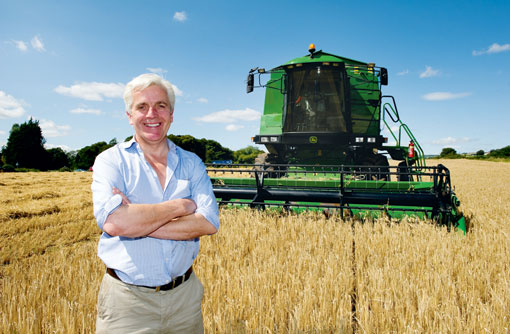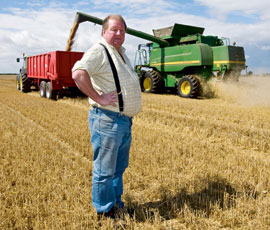Slow and steady start to this year’s harvest

Farmers Weekly‘s Humberside and Northern Ireland Barometer farmers are looking to pick up their harvest pace after a slow, but steady start. Philip Case reports.
MARTIN HAMILTON
The potato harvest has got off to a promising start with high quality and yields for Martin Hamilton (pictured above).
Harvesting began on 3 July with yields averaging around 13 to 14t/ha – and they have been increasing steadily since.
“Average yields are up 15% on last year and we are delighted,” he said. “They are bulking up very nicely and at the moment we are looking at more like 16-17t/ha.”
Unlike most parts of the UK, the weather has been favourable this season, he added. “We have had the rain when we have needed it here.”
The farm grows around 50% of the produce which is turned into mashed vegetable products, supplied directly to major supermarkets and branded under Mash Direct. The rest of the produce is bought in.
Potatoes were the most important crop grown at Ballyrainey House, near Comber, County Down, Northern Ireland, and 130ha of the 325ha farm was devoted to Maris Piper.
By last Monday (25 July), 8ha of Maris Piper – his variety of choice – had been harvested.
A Dewulf 3060 self-propelled harvester takes care of all potato lifting as well as some carrots and parsnips. It can lift 4ha potatoes a day and can carry a maximum 7t on board.
“It needs one man to operate it. We can increase production by increasing the number of tractors and trailers,” said Mr Hamilton.
The potato harvest will continue until around the end of October, he predicted.
Around 168ha of vegetable crops were also grown on farm, including carrots, parsnips, beetroot, red and green cabbage, broccoli and cauliflower. These crops made up the rest of the produce which was turned into healthy convenience food.
“We started to harvest the carrots last week and they’re doing extremely well,” he said. “We’ll start harvesting the root crops soon.”
This week, he has been testing his John Deere 1450 WTS combine with 15ft header to cut Pearl winter barley grown on his brother’s nearby arable farm.
“We’ll use it to cut our 66ha of spring barley, which we should start harvesting in a week to 10 days.”
JONATHAN FENWICK
 Drizzly weather brought combines to a standstill at Beelsby House Farm, near Grimsby earlier this week, but it wasn’t dampening Jonathan Fenwick‘s (pictured left) spirits.
Drizzly weather brought combines to a standstill at Beelsby House Farm, near Grimsby earlier this week, but it wasn’t dampening Jonathan Fenwick‘s (pictured left) spirits.
“We have already cut 60ha of Flagon malting barley, yielding 7.4t/ha, which we’re quite happy with considering the season,” he said.
Moisture content came in “dry and fit” at 14%. Bushel weights were still unknown, although he believed none of the crop needed to go through the drier.
However, the grain nitrogen content was 1.9%, which was higher than expected. “I wanted it to come in at 1.8%, but it came in a bit higher than I’d hoped,” he said.
“I don’t think the maltsters will be able to find any malting barley in this area around 1.8% grain N, so they may have to revise their expectations. However, 1.9% grain N is fine for lager.”
His own crop was not ready, but he had contract cut around 48ha of DK ExPower on a neighbouring farm.
“The ExPower was well ready and it was a pleasure to combine,” he said. “It was drilled early on 10 August on fallow land and it yielded an impressive 4.8t/ha.”
The rain delay was allowing him to finish other jobs on farm, including machinery repairs, refurbishing an existing grain store and building a new one.
“The drizzle may be a blessing in disguise because it is stopping me going too early,” he said.
“Many growers around here are combining rape at 14 to 16% moisture, which will cost them a fortune to dry.
“I’m leaving it a few days so it will combine better. I don’t believe in murdering crops early when you’ve been growing them all year.”
The start of the wheat harvest was around two weeks away, he predicted. “The worry is that everything will come at once. If that’s the case, we’ll just plod on.”
View from the South
Barometer farmers in the South have been experiencing delays to the start of their harvest in a season that continues to surprise.
By Tuesday (26 July), Cambridgeshire grower Edd Banks had cut only 4t of his oilseed rape crop. The recent rains had delayed rape harvesting by a fortnight this year, he said.
“We had a little nibble at some Sesame on Monday. I cut across the headland of one field which I didn’t think was ready and I was right. It’s just not drying weather here, there’s no wind or sun and it’s quite humid. We’ll just have to wait.”
- For more Barometer Farmer coverage, go to our dedicated webpage.

